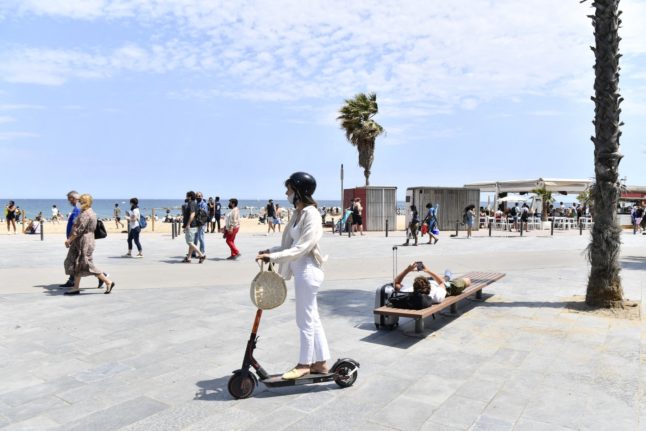According to data from the Spanish Federation of Personal Mobility Vehicles, there are now around 5 million electric scooters in use around Spain.
In many towns and cities, scooters are now competing with bikes as a mode of transport, and the sudden explosion in popularity (and subsequent uptick in accidents) has forced Spain’s DGT to eventually step in and try and regulate their use.
This was with good reason, according to the stats. In 2020 (the last year we have complete data) the DGT recorded 8 ‘personal mobility vehicle users’ (i.e. e-scooter riders) killed in accidents, 97 seriously injured, and 1,097 slightly injured.
READ ALSO: Madrid bans e-scooters on all public transport
Regulations in place since January 2021 attempted to put e-scooter users on the same level as other drivers and established a speed limit of 25 km/h, as well as establishing rules on their use on motorways roads and pavements.
A new traffic law passed in 2022 attempted to further deal with electric scooters, and from 2024 a few more new changes will be brought in. A big part of this is a DGT manual, focusing largely on the design spec for scooters and outlining which are acceptable. Jorge Ordás, a spokesman from the DGT, said that “the technical specifications manual will help to reduce the number of accidents.”
Here’s what you need to know.
READ ALSO: What are the rules for renting electric scooters in Spain?
Safety certificates
The main change is that from January 22nd, 2024, all e-scooters sold in Spain must have a VMP (personal mobility vehicle) mandatory safety certificate in order to be able go public roads, although the scooters purchased before that date may continue to circulate normally until January 22, 2027, when the rules will change again.
The DGT has published a full list of brands and models that currently have a VMP Certificate here, in accordance with the VMP specifications manual.
ITV
In Spain, an MOT is known as an ITV (Inspección Técnica de Vehículos) and is basically a test to certify your vehicle’s roadworthiness. If you drive in Spain, you might’ve taken one of these before.
Electric scooters will now also have to undergo an ITV. This will be based on three key sections: speed, braking, and the battery and wiring.
- Speed: tests will be done to verify that the scooter speed is within the legally allowed range (6 km/h-25 km/h) and aren’t modified in any way.
- Braking: thorough braking tests with a brake meter, GPS or other measurement tool.
- Battery and wiring: checks to see if there is any damage on the battery or body of the scooter, the status and safety of the wiring, if there is an additional battery, and the voltage of any batteries the scooter has.
Helmets
Wearing a helmet is mandatory for drivers of electric scooters and other personal mobility vehicles. Electric scooters are considered vehicles for all purposes and drivers are obliged to comply with traffic regulations in exactly the same way that drivers of cars and motorbikes are.
Visibility
E-scooters must be equipped with front retro-reflectors (in white), on both sides (white or yellow) and one on the rear (in red). In addition, the brake light must be differentiated or combined with the rear light.
Where you can use an e-scooter in Spain
There are also some rules on where you can and can’t use your e-scooter, though these rules are often done at a local level so it’s always advisable to check with your local town hall for the updated rules (and potential fines).
In Madrid and Barcelona, for example, e-scooters are banned on the metro systems. In other cities, such as Bilbao and Valencia, it is still allowed but may stop sooner rather than later. On the Seville metro system, access with a scooter is prohibited from Monday to Friday at peak travel times.
In many parts of Spain, breaking the rules can get you a traffic fine of up to €200.
As The Local reported a few weeks ago, from December 12th, Spain’s state rail operator Renfe banned electric scooters on all of its trains.



 Please whitelist us to continue reading.
Please whitelist us to continue reading.
Member comments